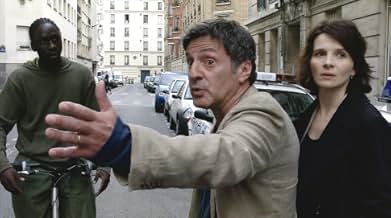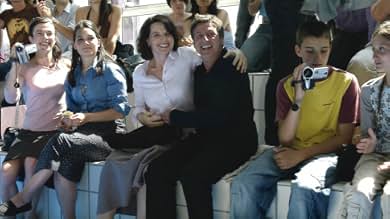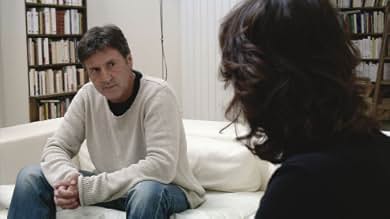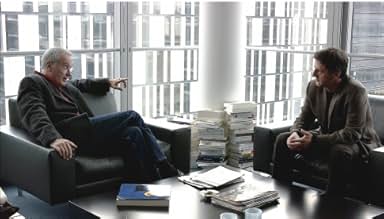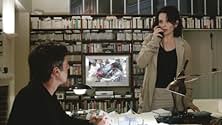एक विवाहित जोड़े को उनके सामने के पोर्च पर छोड़े गए निगरानी वीडियो टेप की एक श्रृंखला से आतंकित किया जाता है।एक विवाहित जोड़े को उनके सामने के पोर्च पर छोड़े गए निगरानी वीडियो टेप की एक श्रृंखला से आतंकित किया जाता है।एक विवाहित जोड़े को उनके सामने के पोर्च पर छोड़े गए निगरानी वीडियो टेप की एक श्रृंखला से आतंकित किया जाता है।
- पुरस्कार
- 29 जीत और कुल 37 नामांकन
फ़ीचर्ड समीक्षाएं
"Caché (Hidden)" uses the visual power of film to create an escalating examination of contemporary paranoia and personal global responsibility the way Francis Ford Coppola's 1974 film "The Conversation" did with sound and fictional criminals.
Writer/director Michael Haneke plays visual tricks on the audience as voyeurs from the opening shot, much as he did with "Code Inconnu," as he coyly plays with technology, building on the pervasive surveillance potential of our times.
The comfortable upper middle class life of married intellectuals Daniel Auteuil and Juliette Binoche is more and more disrupted by spooky video and drawings from some kind of stalker. With a bit heavy-handed constant background TV news coverage about terrorism and other violence in the MidEast, as well as too much irony that Auteuil works on TV (evidently in yet another book discussion show like the central narcissist in "Look At Me (Comme une image)"), race is quickly introduced as a flash point in contemporary Paris from a brief street confrontation and reinforced with Auteuil's flashback dreams of his youth.
While the political angles are obvious, the Hitchcockian tension is very effectively built up (though not narratively resolved even as some secrets are revealed that lead to other inscrutabilities), not just as we see Auteuil repeatedly lie and Binoche practically disintegrate from nerves, but through sudden violence.
While we never understand who all is lying and who isn't, the film further plays on the truth that visual images don't in fact communicate the reality of a situation and can be misleading about relationships, particularly once paranoia has destroyed trust. The film also raises the question if people change their behavior if they know they are being watched and that you can't really hide from your past. Cynically, but perhaps honestly as opposed to in "Crash," here there is no easy resolution of acceptance of guilt and responsibility in personal lives any more than there is in the legacy of colonialism and racism.
Not only is the past never dead, but the film keeps repeating issues of not just am I my brother's keeper, but the sins of the father are revisited on the sons, such that it's important to keep watching even as the credits start to appear at the end (there was much shouting when some folks got up to leave too soon, blocking cryptic clues to those behind them).
The subtitles are very poorly done, with many scenes having them white on white, instead of the much easier to read yellow.
Writer/director Michael Haneke plays visual tricks on the audience as voyeurs from the opening shot, much as he did with "Code Inconnu," as he coyly plays with technology, building on the pervasive surveillance potential of our times.
The comfortable upper middle class life of married intellectuals Daniel Auteuil and Juliette Binoche is more and more disrupted by spooky video and drawings from some kind of stalker. With a bit heavy-handed constant background TV news coverage about terrorism and other violence in the MidEast, as well as too much irony that Auteuil works on TV (evidently in yet another book discussion show like the central narcissist in "Look At Me (Comme une image)"), race is quickly introduced as a flash point in contemporary Paris from a brief street confrontation and reinforced with Auteuil's flashback dreams of his youth.
While the political angles are obvious, the Hitchcockian tension is very effectively built up (though not narratively resolved even as some secrets are revealed that lead to other inscrutabilities), not just as we see Auteuil repeatedly lie and Binoche practically disintegrate from nerves, but through sudden violence.
While we never understand who all is lying and who isn't, the film further plays on the truth that visual images don't in fact communicate the reality of a situation and can be misleading about relationships, particularly once paranoia has destroyed trust. The film also raises the question if people change their behavior if they know they are being watched and that you can't really hide from your past. Cynically, but perhaps honestly as opposed to in "Crash," here there is no easy resolution of acceptance of guilt and responsibility in personal lives any more than there is in the legacy of colonialism and racism.
Not only is the past never dead, but the film keeps repeating issues of not just am I my brother's keeper, but the sins of the father are revisited on the sons, such that it's important to keep watching even as the credits start to appear at the end (there was much shouting when some folks got up to leave too soon, blocking cryptic clues to those behind them).
The subtitles are very poorly done, with many scenes having them white on white, instead of the much easier to read yellow.
This was a very good film, an excellent study in psychological tension. Unfortunately, I don't think a lot of Americans or really anyone who isn't very familiar with the French-Algerian war will be able to understand it. It's about the horrors of that war and the French denial of their part in it -- very much tying in to the French youth race riots we saw last year. It also quietly draws some parallels with the war in Iraq. The ending was perhaps much too subtle. Everyone around me as we left the theater here in Los Angeles was expressing confusion. This was an older, more sophisticated audience, too. I don't think they really understood what was happening all along.
That said, it was still fantastic. I'm glad that at least outside of the U.S. it's gotten the recognition it deserves.
That said, it was still fantastic. I'm glad that at least outside of the U.S. it's gotten the recognition it deserves.
Greetings again from the darkness. French films have a tradition of being filmed intimately, almost in a voyeuristic manner. Writer/Director Michael Haneke takes it a step further with a story about a family being watched. The idea is pretty creepy as Daniel Auteuil and Juliette Binoche have videos dropped on their doorstep showing the almost total nonaction occurring right outside their front door. This puts quite a strain on their already passionless relationship.
The joy of a suspense story is assembling the clues and deciding what is and what is not vital to solving the mystery. Haneke does an admirable job of tossing clues and false trails on the viewer. The general consensus seems to be that if you somehow miss the last shot of the film, you can't solve it. In fact, that final shot merely reinforces what we have already been shown.
The blending of voyeurism, terrorism and revenge causes much stress for the two leads. Auteuil is solid in his role, but the lovely Ms. Binoche really shines in her much more emphatic turn as the wife and mother who begins to unravel as the men in her life seem to turn on her. Watching for details such as the TV newscasts, facial expressions and the timing of the appearance and disappearance of key characters will easily allow the viewer to solve the mystery, but it does not take away from the tension the situation creates.
This is a pretty solid thriller, but not in the class of Francois Ozon's "Swimming Pool" from a couple of years ago. Of course the topicality of technology makes "Cache" a bit more relevant at the moment.
The joy of a suspense story is assembling the clues and deciding what is and what is not vital to solving the mystery. Haneke does an admirable job of tossing clues and false trails on the viewer. The general consensus seems to be that if you somehow miss the last shot of the film, you can't solve it. In fact, that final shot merely reinforces what we have already been shown.
The blending of voyeurism, terrorism and revenge causes much stress for the two leads. Auteuil is solid in his role, but the lovely Ms. Binoche really shines in her much more emphatic turn as the wife and mother who begins to unravel as the men in her life seem to turn on her. Watching for details such as the TV newscasts, facial expressions and the timing of the appearance and disappearance of key characters will easily allow the viewer to solve the mystery, but it does not take away from the tension the situation creates.
This is a pretty solid thriller, but not in the class of Francois Ozon's "Swimming Pool" from a couple of years ago. Of course the topicality of technology makes "Cache" a bit more relevant at the moment.
Michael Haneke's film begins as a clinical, psychological and social study of a respectable individual in European society. It ends as a study of a larger contemporary European segment of its population. It reminds one of the early works of Fassbinderonly Haneke's production values are more sophisticated. The camera becomes a charactera major one at that. This reminds the viewer that he is watching cinema at several junctures and that s/he is part of the communication/entertainment process. It makes you constantly ponder if the cinema you are watching is providing truth or lies (or something in between) 24 frames per second. The fixed-medium range shots that opens and closes the film indicate the view and mood of the director--clinical, somewhat distanced and unshaken by the story he unfolds. We also notice that what we are seeing, might not be what we think we are seeing. Antonioni did this to us in "Blow up" several decades ago.
After the screening at the on-going Dubai film festival, I was amused at the director carefully distancing himself from a situation where he could have resolved the issues-he prefers to leave it to the viewer to do so. In a way the entertainment continues after the screening if you choose to reflect on what you saw.
At the obvious level, it is a study of colonial guilt of Europe and race relations. At a deeper level, it probes complacency and bourgeois temperaments of the financially secure classes in society. Escape from reality comes from closing curtains, shutting off the outside world and consuming sleeping tablets. At another level, the film explores the attitudes of three distinct generations towards social relationships.
Haneke uses graphic shocking violent scenes to jolt the audiences when they least expect it. He seems to enjoy the process. His strength is not in his cinema (Kubrick, in comparison, was brilliant at this game). Hanneke's strength lies elsewhereeliciting fascinating performances from his cast. Daniel Auteuil, Julliette Binoche, Maurice Benichou and Annie Girardot were simply fascinating to watch.
The strength of the film lies in the subject that will disturb anyone. Many of us have something in our past that we wish to hide or not discuss. Yet there is a conscience in us that nags us to believe that there was a witness to that wrongdoing--a witness who cannot be buttonholed. It is this psychological fact that makes the film tick, much less its cinematic flourish.
After the screening at the on-going Dubai film festival, I was amused at the director carefully distancing himself from a situation where he could have resolved the issues-he prefers to leave it to the viewer to do so. In a way the entertainment continues after the screening if you choose to reflect on what you saw.
At the obvious level, it is a study of colonial guilt of Europe and race relations. At a deeper level, it probes complacency and bourgeois temperaments of the financially secure classes in society. Escape from reality comes from closing curtains, shutting off the outside world and consuming sleeping tablets. At another level, the film explores the attitudes of three distinct generations towards social relationships.
Haneke uses graphic shocking violent scenes to jolt the audiences when they least expect it. He seems to enjoy the process. His strength is not in his cinema (Kubrick, in comparison, was brilliant at this game). Hanneke's strength lies elsewhereeliciting fascinating performances from his cast. Daniel Auteuil, Julliette Binoche, Maurice Benichou and Annie Girardot were simply fascinating to watch.
The strength of the film lies in the subject that will disturb anyone. Many of us have something in our past that we wish to hide or not discuss. Yet there is a conscience in us that nags us to believe that there was a witness to that wrongdoing--a witness who cannot be buttonholed. It is this psychological fact that makes the film tick, much less its cinematic flourish.
Michael Haneke the austere Austrian director of such critically acclaimed films as "Funny Games", "Code Unknown" and "The Piano Teacher" has created in "Caché" (Hidden) his finest film to date.
Starring Daniel Auteuil and Juliette Binoche the film is a taut and tense personal thriller, which examines important subjects such as guilt and responsibility in the context of western comfort.
Georges and Anne are a happily married middle class couple who both work in the arts. The balance of their lives is suddenly disturbed when they begin to receive video cassettes seemingly surveying the exterior of their home. Anne is quite dismissive of the tape but immediately Georges believes there is a sinister element to the tape. Soon they receive more tapes and disturbing drawings. As Georges fears for the safety of his family he suddenly has to confront his past and allow his wife to learn the hidden secrets of his past.
Haneke's film plays on one level like a common thriller, but it has much deeper psychological echoes as the "hero" George is revealed not to be quite the upstanding family man his family believed him to be. As his wife struggles to come to terms with the revelations their entire comfortable existence disintegrates.
Haneke is not just interested in creating a thriller however and the auteur expertly dissects George and Annes bourgeois life and implicates them both in the treatment by western culture of the east and the third world.
Acting in the film is terrific. Daniel Auteuil is simply excellent in his role, the actor manages to explore his character enough to make us forget it is a portrayal. Juliette Binoche as his wife initially seems not to be at the center of the film, but the stunning actress manages to place herself at the emotional center of the film as the wife and mother.
Expert supporting roles are provided by Maurice Benichiou, Annie Girardot and Nathalie Richard among others.
"Caché" is at once an intriguing thriller and a wonderful examination of guilt and responsibility in a very modern context.
Starring Daniel Auteuil and Juliette Binoche the film is a taut and tense personal thriller, which examines important subjects such as guilt and responsibility in the context of western comfort.
Georges and Anne are a happily married middle class couple who both work in the arts. The balance of their lives is suddenly disturbed when they begin to receive video cassettes seemingly surveying the exterior of their home. Anne is quite dismissive of the tape but immediately Georges believes there is a sinister element to the tape. Soon they receive more tapes and disturbing drawings. As Georges fears for the safety of his family he suddenly has to confront his past and allow his wife to learn the hidden secrets of his past.
Haneke's film plays on one level like a common thriller, but it has much deeper psychological echoes as the "hero" George is revealed not to be quite the upstanding family man his family believed him to be. As his wife struggles to come to terms with the revelations their entire comfortable existence disintegrates.
Haneke is not just interested in creating a thriller however and the auteur expertly dissects George and Annes bourgeois life and implicates them both in the treatment by western culture of the east and the third world.
Acting in the film is terrific. Daniel Auteuil is simply excellent in his role, the actor manages to explore his character enough to make us forget it is a portrayal. Juliette Binoche as his wife initially seems not to be at the center of the film, but the stunning actress manages to place herself at the emotional center of the film as the wife and mother.
Expert supporting roles are provided by Maurice Benichiou, Annie Girardot and Nathalie Richard among others.
"Caché" is at once an intriguing thriller and a wonderful examination of guilt and responsibility in a very modern context.
क्या आपको पता है
- ट्रिवियाThere is no music, save for the theme on George's show, and background music at Anne's publishing party.
- गूफ़During the tape where Georges pulls up in his car and parks at night the headlights clearly cast a huge distinct shadow of the camera on the wall.
- भाव
Georges Laurent: Isn't it lonely, if you can't go out?
Georges's Mom: Why? Are you less lonely because you can sit in the garden? Do you feel less lonely in the metro than at home? Well then! Anyway, I have my family friend... with remote control. Whenever they annoy me, I just shut them up.
- क्रेज़ी क्रेडिटThe opening credits appear over a shot of the husband and wife's house, but they appear one by one and in rows. By the time the credits are over they are all shown together, much like they would on a poster or in the credits section of a movie trailer.
- कनेक्शनFeatured in Smagsdommerne: एपिसोड #3.13 (2006)
टॉप पसंद
रेटिंग देने के लिए साइन-इन करें और वैयक्तिकृत सुझावों के लिए वॉचलिस्ट करें
- How long is Caché?Alexa द्वारा संचालित
विवरण
- रिलीज़ की तारीख़
- कंट्री ऑफ़ ओरिजिन
- आधिकारिक साइट
- भाषा
- इस रूप में भी जाना जाता है
- Caché (Hidden)
- फ़िल्माने की जगहें
- 49 Rue Brillat-Savarin, Paris 13, पेरिस, फ़्रांस(Georges' house)
- उत्पादन कंपनियां
- IMDbPro पर और कंपनी क्रेडिट देखें
बॉक्स ऑफ़िस
- बजट
- €80,00,000(अनुमानित)
- US और कनाडा में सकल
- $36,47,381
- US और कनाडा में पहले सप्ताह में कुल कमाई
- $57,010
- 25 दिस॰ 2005
- दुनिया भर में सकल
- $1,61,97,824
- चलने की अवधि
- 1 घं 57 मि(117 min)
- रंग
- ध्वनि मिश्रण
- पक्ष अनुपात
- 1.78 : 1
इस पेज में योगदान दें
किसी बदलाव का सुझाव दें या अनुपलब्ध कॉन्टेंट जोड़ें

